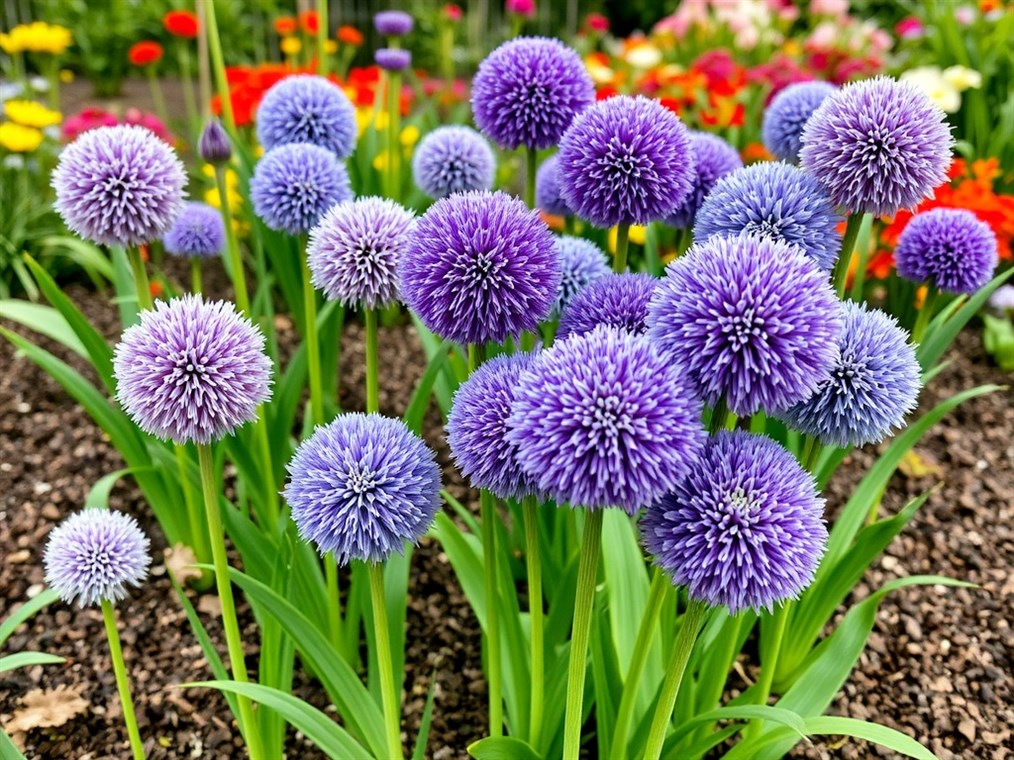Alliums: Happy Bulbs, Happy Garden – Getting the Soil Right
Alliums! Those cool, globe-shaped ornamental onions that add a real ‘wow’ factor to any garden. I absolutely love them. But here’s a secret: to get them to truly shine, you’ve gotta nail the soil. Whether you’re dreaming of a sea of purple ‘Sensation’ alliums, or a huge harvest of tasty onions, understanding what they like under their “feet” is key. Let’s dig in, shall we?
First things first: drainage. Seriously, drainage is the name of the game. Alliums are drama queens when it comes to soggy soil. They absolutely hate having wet feet, especially when they’re supposed to be snoozing during their dormant season. Bulb rot? Yeah, that’s the enemy, and it thrives in waterlogged conditions. Think of it this way: imagine trying to breathe underwater. Not fun, right? Same goes for allium bulbs.
How do you know if you have a drainage problem? Easy. If you see puddles hanging around in your garden hours after it rains – like, more than half a day – Houston, we have a problem.
Now, let’s talk ideal soil. Alliums aren’t super fussy, but they really love a good sandy loam. It’s like the Goldilocks of soil types – not too heavy, not too light, just right. This mix gives them the perfect balance: drainage so they don’t drown, aeration so they can breathe, and enough nutrients to keep them happy and growing strong.
Think of sandy soil as the bouncer at the club – it keeps the water moving and prevents overcrowding. Loam is the friendly host, making sure everyone’s comfortable and has what they need. And the “richness”? That’s the gourmet meal that fuels the party!
What about pH? Well, alliums are pretty chill. They like their soil slightly acidic to neutral, somewhere in the 5.5 to 7.0 range. Don’t stress too much about this, but it’s worth checking. Grab a soil testing kit – they’re cheap and easy to use. If your soil’s too alkaline (above 7.0), you can bring it down a notch with some peat moss or sulfur. Just go easy on the manure, as this can affect the acidity level of the soil.
Okay, so what if your soil isn’t perfect? Don’t panic! Most soils can be tweaked to make alliums happy. Got clay soil? Ugh, I feel your pain. Clay is heavy, dense, and drains like a bathtub with the plug in. The fix? Organic matter! Compost, peat moss, well-rotted manure – all are your friends. Mix them in to lighten things up. I even like to toss in some grit for extra drainage. Break up the clay about a foot deeper than where you’re planting the bulbs and amend the bed with sand.
Sandy soil? That’s the opposite problem – it drains too well. Water just zips right through it. The solution is similar: organic matter! Peat moss, aged leaf compost, well-aged compost – they’ll help hold onto moisture.
Basically, before you plant, load up your soil with compost or something similar. It’s like giving your alliums a head start in life.
Do alliums need fertilizer? Not a ton, but a little boost helps. When you plant, toss a handful of bone meal into the hole. It’s like a protein shake for their roots. Then, in early spring, when you see them starting to grow, give them a balanced, slow-release fertilizer. Something like a 10-10-10 NPK will do the trick, especially for edible onions. Just don’t go overboard with the nitrogen – you want flowers, not just a ton of leaves.
And hey, what about growing alliums in pots? Absolutely! Just use a good quality, peat-free, all-purpose potting mix. Make sure your pot has drainage holes, and water regularly, but let the soil dry out a bit between waterings. If you live where it gets seriously cold, give your potted alliums some winter protection. An unheated shed, garage, or basement works great.
A few extra tips for the road: Alliums love sunshine – at least 6-8 hours a day. Plant your bulbs in the fall, about 2-3 times as deep as they are wide. Don’t overwater them, especially when they’re dormant. And a little mulch (compost or well-rotted manure) never hurts.
So, there you have it! The secrets to happy alliums, all unlocked with a little soil savvy. Get the soil right, and you’ll be rewarded with a garden full of these amazing plants. Happy gardening!

